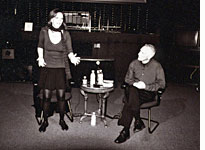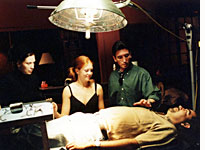The People Whisperers
What a Hollywood acting coach taught me about teaching.

Over the last two and a half years, I traveled across the country in search of life-changing teachers and mentors from all different walks. I met race-car drivers, Indian potters, ballet dancers, rappers, research scientists, law professors, Montessori teachers, aerobatic pilots, master carpenters, and many others. The book that emerged from those travels is called Guiding Lights. It tells the stories of several of these remarkable people and the ways they transform their apprentices. And it's the basis for a series of four pieces on Slate and NPR's Day to Day in which figures from the book teach me to do something new.
I'll begin, as I begin the book, with a Hollywood acting coach named Ivana Chubbuck. Why? Not just because she excels at her craft, having taught the likes of Oscar winners Halle Berry and Charlize Theron, but also because her most striking talent is for reading people, all their utterances and body language, in their finest unwitting detail. Great teaching, in my view, begins with that kind of deep, full-body listening. Great teachers are people whisperers.
This is not as obvious as it sounds. We often have the notion in our culture that the Great Teacher is a Great Communicator: the enthralling evangelist, the mesmerizing orator. Of course, being able to communicate powerfully is vital to effective teaching. But it is still secondary. What separates good from great, across professions and domains, is the ability to receive before you transmit.

Ivana Chubbuck, at first glance, seems to be a first-rate transmitter. She broadcasts her achievements without stop. She has a forceful way about her, feral and aggressive, and she's physical and vulgar in her teachings. She has a one-track philosophy of winning that makes her acting class something like a self-empowerment seminar. She cannot abide victims or whiners. Every actor, she says, must know what the character's objective is in a scene—to win someone's love, respect, sympathy, whatever—and then must have a ruthlessness about achieving the objective. And as in the scene, teaches Ivana, so in life.
That overbearing worldview may mark her as distinctly L.A., but it also obscures her deep, almost creepily empathic, intuition. The first time we met, Ivana saw right through me. Right through my careful presentation of self, my reportorial pose, into the inner chambers. We'd known each other for 15 minutes. I was there to interview her, and had my leather-bound notebook, my questions all lined up. We chatted. I told her about the book I was writing. In passing, in response to I don't even remember what, maybe something she'd said about her family, I mentioned that my father had died over a decade ago.
An hour and a half later, after answering my queries about how she had become an acting coach, about her challenging students, her general philosophy of teaching—after all the preliminaries—Ivana decided to show me rather than tell me. We did a little exercise. She asked me to pretend I was drunk. I hadn't expected this, but here we were, and I felt more awkward about not playing along than about playing. So I gave it a shot. At first I stumbled about her living room, mimicking the weave and wobble of someone who's had one too many drinks. But my imbalance was too studied, and my eyes were too alertly scanning her face for reactions. She asked me to remove my glasses. Without them my vision descends to 20/400: The world dissolves into bleeding pools of color.

It worked. I was utterly disoriented. I couldn't see, but more important I couldn't tell where I was going next. I was genuinely in less control of myself than I'd been only a few minutes earlier. Pretty soon I was doing quite the drunk act in her house, and she chuckled with approval, paced around me in the high-ceilinged, echoey room, giving loose direction, telling me to pick up this glass or that book, to talk to her, to slur my words more when speaking.
Then, out of the blue, she asked me to think about my father. Just when I thought we were playing one game, she revealed another. As his face flashed across my mind, my own face slackened involuntarily. My mouth fell open. I exhaled, then again, like a gasp. It lasted a second, and it was over. I wasn't able to play a drunk anymore. But neither was I in the state I'd been in prior to our little scene. "Do you feel the difference?" she asked. I nodded, swallowing. Maybe now, her arched brow suggested, I would be ready to learn.
In a scene we worked on together more recently for NPR's Day to Day, in which she transformed me into a cold-blooded killer, Ivana pushed me past that moment of exposure. She surprised me—even though this time I'd been expecting it. She began by asking about my child, and we chatted about little girls and childhood games. Then she pivoted sharply. She asked me to imagine an abduction, assault. She asked me what I would do to the perpetrator. And then she had me read a scene from the film A Time To Kill, in which a man is on trial for killing the two men who'd kidnapped and raped his daughter.
With Ivana's prodding, I became by degrees more savage and purposeful in my role. When we reached the payoff line, I thought I should show righteous anger. Don't push, she said. She was right. When I read it again, you could hear something new in my voice: the icy satisfaction of vengeance. Ivana had flipped me, using leverage I didn't even realize I had given her. And our lesson reminded me that teaching doesn't start when the teacher starts talking. It starts long before.
It does not end there, of course. Teachers like Ivana Chubbuck are not just picking up a student's vibes and following them blindly; they have a distinct point of view to impart, a method to pass on and a goal to achieve. They manipulate. And that's not inherently a bad thing. When you think about it, every act of teaching is a kind of manipulation. We hope—we trust—that the manipulation is well-meant, guiding us to discovery and to a clearer sense of our own voice. But ultimately, we can be sure of that only by trying, by entering into the apprenticeship. That is the risk that every actor, on every stage, is asked to take.
Next week: Can a Major League pitching coach train someone not to overthink on the mound?